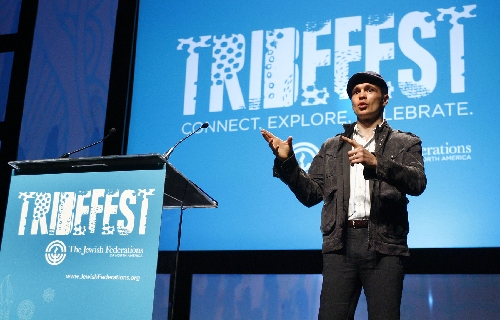Jewish boxer Foreman finds higher calling
They packed the Islander Ballroom at Mandalay Bay Tuesday morning. More than 1,300 men and women, some who had just reached adulthood, others middle age, all bound together by their faith.
They paid rapt attention to the speaker, who in 10 minutes told them most of his amazing life story of growing up amid anti-Semitism in the old Soviet Union, immigrating to Israel, training with and befriending Arab boxers and ultimately landing in New York, where he honed his craft, eventually becoming a world champion.
He told his audience to never lose faith, that anything in this world is possible, and that no matter how deep or shallow their Judaism roots were, they were linked together. When he finished, they stood and applauded.
Yuri Foreman, the former world super welterweight champion and rabbi-in-waiting, spoke at Tribefest as a guest of the convention sponsored by the Jewish Federation of North America. He exhaled as he left the stage, having just gotten a taste of what it will be like to one day lead a congregation.
"I hoped they liked what I had to say," said Foreman, who didn't have a prepared script, instead speaking from the heart.
He didn't have time to tell the people about the roller-coaster ride his life has been the past nine months. How he bravely fought on one leg in Yankee Stadium in June after his right knee gave out, as he ultimately lost his WBA super welterweight title to Miguel Cotto. That his knee would require reconstructive surgery, sidelining him for six months, relegating him to the couch in his Brooklyn, N.Y., home, watching the World Cup on television.
Nor did he have time to tell about the birth of his son, Lev, in August, how blessed he was that God would provide Foreman and his wife, Leyla, the opportunity to be parents. And there wasn't room to talk about the devastation he felt in October, when he got a phone call in the middle of the night telling him that his manager and father figure, Murray Wilson, had died of a heart attack.
If Foreman had time to tell those stories, there wouldn't have been a dry eye in the room. But Foreman, who a year from now will have finished his rabbinical training, kept the talk upbeat. He probably gained 1,300 fans who will root for him Saturday when he fights Pawel Wolak at the MGM Grand Garden in a 10-round super welterweight bout on the undercard of the Cotto-Ricardo Mayorga super welterweight title fight.
"I hope they'll watch; it'll be after Shabbos (the Jewish sabbath)," he said with a laugh.
Foreman (28-1, eight knockouts) said his right knee is fine.
"After sparring the first week, I realized there was nothing to worry about," said Foreman, who will not wear a brace on his repaired knee.
While enjoying his new role as a dad, he is still coming to grips with the loss of Wilson, who looked after him like a surrogate father and did a great job of overseeing his boxing career.
"It's tough not having him around," said Foreman, who will wear a patch on his trunks Saturday with Wilson's name on it. "I miss his company. On fight night, he would be more tense than me, and it would relax me."
Foreman said he'd love to get a rematch with Cotto at some point. But first, he steps into the ring to face Wolak (28-1, 18 KOs).
"I know him from New York; he's a tough fighter," Foreman said. "He puts a lot of pressure on you. But I've prepared for this fight knowing I have to be on top of my game and be a boxer."
As Foreman spoke Tuesday, Elliot Karp, the president and CEO of the Jewish Federation of Las Vegas, said Foreman was the perfect person to cap the three-day event that celebrated Jewish culture and issues.
"He shares a common bond with everyone," Karp said. "Not everyone's a doctor or a lawyer. And his story is so uplifting."
Too bad Foreman didn't have time to tell the whole story Tuesday -- particularly the last nine months. The Wailing Wall might have moved from Jerusalem to the Strip.
Contact reporter Steve Carp at scarp@reviewjournal.com or 702-387-2913. Follow him on Twitter: @stevecarprj.






















